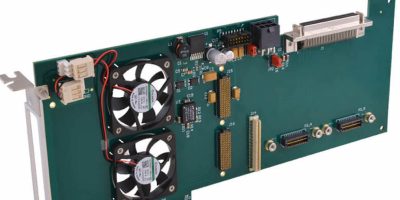Carrier card adds depth to computers or servers, says Acromag
Power, PCIe bus signals and cooling air can be added to an XMC mezzanine module via the APCe8775 carrier card. This way, it can deliver signal processing in small embedded computer systems, explained Acromag.
The carrier card is a simple and cost-effective solution that allows a PC to communicate with an XMC mezzanine module over a PCI Express (PCIe) bus in a PC-based desktop computer system.
The PCIe bus adapter board allows a PC (PCIe bus master) to control and communicate with the hosted XMC module. It acts as an adapter to route signals between the system’s PCIe bus and the XMC module connector.
The I/O signals are accessible via rear connectors and though the front mounting bracket. To simplify wiring, Acromag offers cables to connect the carrier’s rear I/O signals to other carrier cards in adjacent slots. Cables are also available to connect the carrier’s rear I/O to a front panel connector in an adjacent slot.
The APCe8775 can be used with any XMC modules from Acromag’s range of FPGA and I/O products or used with any third-party ANSI / VITA 42-compliant mezzanine modules.
The carrier card features a single XMC module slot and an eight-lane PCI Express interface. The design includes two cooling fans and support for a high-speed serial interface between neighbouring cards using protocols such as XAUI or Aurora.
The card is capable of routing 20 high speed signals and 38 additional differential pairs from the XMC Q Pairs connectors and routing 32 differential pairs to SCSI-3 rear connector for LVDS I/O from the XMC module.
JTAG programming connector supports a Xilinx programmer for use with hosted FPGA modules. There is also an auxiliary power connection for a 12V source.




